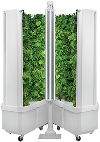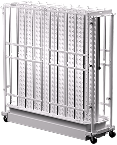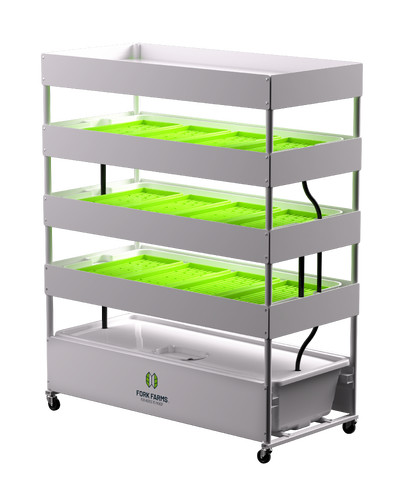Are Hydroponic-Grown Foods as Healthy as Soil-Grown Foods?
Hydroponics is a method of growing plants in nutrient-rich water instead of soil. Rather than relying on natural soil composition, hydroponic systems use a soil-less foundation like perlite, coco coir, or rockwool to support the plants. And their nutrient solution is carefully balanced, delivering essential minerals and elements directly to the plant roots.
There are several advantages of hydroponic systems over traditional farming, beginning with their surroundings. Hydroponics allows farmers to create an ideal environment for crop growth. Temperature, humidity, light, and nutrient levels can be precisely managed, ensuring optimal conditions for plant development. This also helps contribute to better nutrient uptake (more on that shortly) and healthier plants.
Other key benefits include water efficiency (compared to soil-based methods, hydroponics uses significantly less water), better crop density and yield (there’s no space required for soil; the ability to grow vertically offers better space usage), and superior pest and disease control (we’ll get to that in a minute, too).
All told, this water-based system has gained popularity in recent years as a highly efficient method of cultivation. But even while taking into account the aforementioned advantages, a key question arises: Are hydroponic-grown foods as healthy as soil-grown foods? Let’s explore the factors that can provide some clarity on the issue.
Nutrient Composition and Delivery
One of the main questions when comparing hydroponic and soil-grown foods is their nutrient composition. It’s commonly understood that soil contains many types of essential minerals and microorganisms that add to plants' nutritional value. However, hydroponic systems have an added advantage in that they allow for precise control over nutrient delivery. This helps ensure plants receive the minerals they need as efficiently as possible.
The argument holds that because hydroponic plants are grown in a controlled environment, they’re also better able to absorb nutrients than crops grown in soil. Hydroponic farmers can even scale up the nutrients they give to plants during the growing process, potentially leading to still higher nutrient content in these foods.
A Hydroponic Garden Provides Food Free of Pesticides and Chemicals
Another important factor to consider is the use of pesticides and chemicals in both cultivation methods. Soil-grown crops often require pesticides to combat pests and diseases. While these chemicals are essential for protecting plants, they can accumulate in the soil over time, potentially affecting the nutritional quality of the produce.
Even most organically grown crops aren’t completely chemical-free. They’re still subject to the same harmful pests, bacteria, and diseases found in non-organic farming.
On the other hand, hydroponics provides a virtually pest-free environment that all but eliminates the need for chemical pesticides. Fewer pesticides also reduce the chance of chemical residue, ultimately resulting in safer and potentially healthier crops.
Lack of Soil Contamination With a Hydroponic Garden
Growing food by traditional methods always carries the risk of contamination from the soil, or even during the shipping process. This can lead to widespread problems before they're even noticed.
However, hydroponic growing significantly reduces the threat of contamination. Eliminating soil and manure-based fertilizer from the equation minimizes the chances of contaminated foods reaching their destination, presenting yet another major health benefit of hydroponics compared to traditional farming techniques.
What’s the Verdict on Hydroponic versus Soil Grown Food?
Research suggests that the nutritional content of hydroponic-grown foods can be just as high, if not higher, than that of their soil-grown counterparts. Studies comparing the nutritional content of crops from both methods have shown similar or even higher levels of essential nutrients, vitamins, and minerals in hydroponic produce.
The ability to fine-tune nutrient delivery in hydroponics can also enhance the plant’s ability to absorb essential minerals, potentially leading to higher nutrient concentration. Their controlled environment can eliminate nutrient deficiencies that plants may experience from inadequate soil conditions in traditional agriculture.
Another thing to keep in mind is that fresh fruits and vegetables lose nutrients over time. Hydroponic farms, meanwhile, are usually located near where people live, so their produce is typically eaten soon after being harvested. If your food has to travel a long way to reach you–as is the case with many traditional farms–it isn’t likely to be as nutritious as lettuce that was harvested close by the day before.
Still, it’s important to note that the nutritional content of crops can be influenced by various factors beyond how they’re grown. Factors like the type of plants you’re growing, how mature they are at the time of harvest, how they’re handled and transported, and their storage conditions all play a role in maintaining nutrient levels and ensuring fresh, healthy, and delicious food.
The Flex Farm Solution
Here at Fork Farms, we’re committed to transforming hydroponic gardening. And our signature product, the Fork Farms/Flex Farm Advantage, represents the highest level of efficiency, scalability, and innovation in hydroponic technology.
Among its benefits, the Flex Farm comes with support from our team of hydroponics experts, who will provide guidance whenever you need it and are committed to the success of your operation. You'll also have access to the Farmative community, a network of growers where you can collaborate, share ideas, and learn from other hydroponic enthusiasts.
To learn more, or if you’re ready to begin your journey, connect with us today!
Important Links:
























